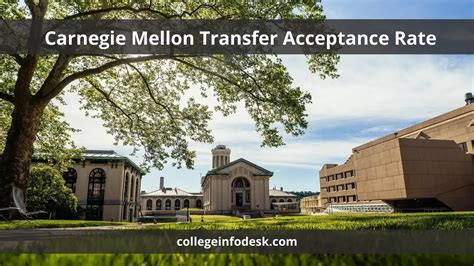Understanding the Significance of Acceptance Rates
When applying to highly competitive universities, prospective students often focus on acceptance rates as a key indicator of their chances of admission. However, it’s crucial to remember that acceptance rates are only a snapshot of the admissions process and should not be the sole factor in your decision-making.

Carnegie Mellon SCS Acceptance Rate Overview
Carnegie Mellon University’s School of Computer Science (SCS) is consistently ranked among the top computer science programs in the world. As such, it attracts a highly competitive pool of applicants each year.
According to the latest data, the acceptance rate for Carnegie Mellon SCS is around 6-8%. This means that for every 100 applications received, only 6-8 students are offered admission.
Factors Influencing Acceptance Rates
Several factors can influence the acceptance rate of a university, including:
- Applicant pool quality: The overall strength of the applicant pool can affect the acceptance rate. In recent years, Carnegie Mellon SCS has witnessed a surge in applications from highly qualified students.
- Program popularity: Programs with high demand tend to have lower acceptance rates. SCS is a particularly popular program at Carnegie Mellon, which contributes to its competitive acceptance rate.
- Admissions criteria: Universities set specific admissions criteria that applicants must meet. Carnegie Mellon SCS considers factors such as GPA, standardized test scores, extracurricular activities, and personal statements.
- Institutional capacity: The number of students a university can accommodate also influences acceptance rates. Carnegie Mellon SCS has limited capacity, which affects the number of students they can admit.
Implications for Applicants
The low acceptance rate at Carnegie Mellon SCS highlights the highly competitive nature of the admissions process. Applicants should carefully consider their qualifications and make sure they present a strong application that showcases their academic achievements, extracurricular involvement, and commitment to computer science.
Tips for Increasing Your Chances of Admission
While there is no guarantee of admission, there are steps you can take to increase your chances:
- Excel academically: Maintain a high GPA and perform well in challenging math and science courses.
- Demonstrate passion: Engage in extracurricular activities related to computer science, such as programming clubs, hackathons, and summer research programs.
- Prepare thoroughly for standardized tests: Aim for high scores on the SAT or ACT and consider taking subject-specific exams like the SAT Math Level 2 or AP Computer Science Exam.
- Craft a compelling personal statement: Use your personal statement to highlight your unique qualities, motivations, and career aspirations.
- Seek support: Reach out to teachers, counselors, and mentors for guidance and feedback on your application.
Comparing Carnegie Mellon SCS to Other Top Programs
When comparing Carnegie Mellon SCS to other top computer science programs, it’s important to consider several factors:
| Feature | Carnegie Mellon SCS | Stanford University | Massachusetts Institute of Technology | University of California, Berkeley |
|---|---|---|---|---|
| Acceptance Rate | 6-8% | 4.3% | 3.9% | 15% |
| Average GPA | 3.9 | 3.92 | 3.96 | 3.77 |
| Average SAT Score | 1520 | 1515 | 1525 | 1490 |
| Research Funding | $200 million+ | $150 million+ | $1 billion+ | $250 million+ |
| Notable Alumni | Elon Musk, David Filo, Eric Schmidt | Marissa Mayer, Larry Page, Steve Wozniak | Tim Berners-Lee, Vint Cerf, Robert Metcalfe | David Patterson, Michael Stonebraker, William Kahan |
Pros and Cons of Attending Carnegie Mellon SCS
Pros:
- Prestigious reputation: Carnegie Mellon SCS is recognized as one of the world’s leading computer science programs.
- World-class faculty: The school boasts a highly distinguished and experienced faculty.
- State-of-the-art facilities: SCS provides students with access to cutting-edge computational resources and research labs.
- Excellent career opportunities: Graduates from SCS are highly sought after by top employers in the tech industry.
Cons:
- Highly competitive admissions: The low acceptance rate makes getting into SCS a challenge.
- Academic rigor: The program is known for its demanding coursework and high workload.
- Cost: Carnegie Mellon is a private university, and the cost of attendance can be substantial.
- Location: The school is located in Pittsburgh, which may not be the most popular or convenient location for some students.
Summary
The Carnegie Mellon SCS acceptance rate is a reflection of the program’s high standards and competitive nature. While the acceptance process is demanding, applicants who present strong qualifications and demonstrate a clear passion for computer science have a better chance of being admitted. By understanding the factors influencing the acceptance rate and employing effective strategies, prospective students can increase their chances of admission to this prestigious program.
